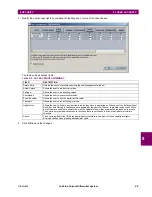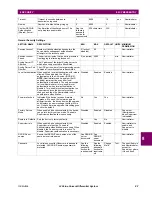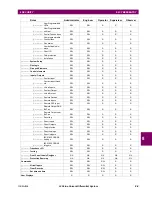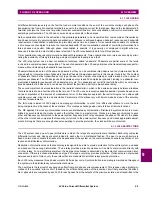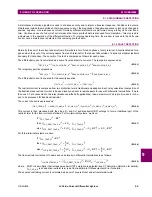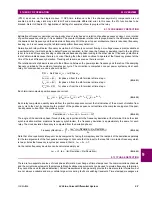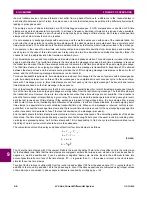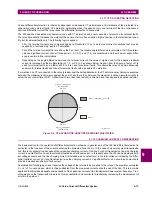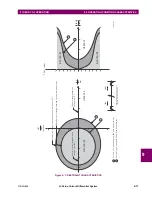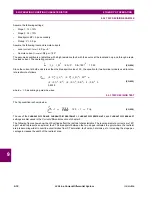
9-6
L30 Line Current Differential System
GE Multilin
9.1 OVERVIEW
9 THEORY OF OPERATION
9
9.1.9 FREQUENCY TRACKING AND PHASE LOCKING
Each relay has a digital clock that determines when to take data samples and which is phase synchronized to all other
clocks in the system and frequency synchronized to the power system frequency. Phase synchronization drives the relative
timing error between clocks to zero, and is needed to control the uncertainty in the phase angle of phasor measurements,
which will be held to under 26 microseconds (0.6 degrees). Frequency synchronization to the power system eliminates a
source of error in phasor measurements that arises when data samples do not exactly span one cycle.
The block diagram for clock control for a two terminal system is shown in the following figure. Each relay makes a local esti-
mate of the difference between the power system frequency and the clock frequency based on the rotation of phasors.
Each relay also makes a local estimate of the time difference between its clock and the other clocks either by exchanging
timing information over communications channels or from information that is in the current phasors, depending on which-
ever one is more accurate at any given time. A loop filter then uses the frequency and phase angle deviation information to
make fine adjustments to the clock frequency. Frequency tracking starts if the current at one or more terminals is above
0.125 pu of nominal; otherwise, the nominal frequency is used.
Figure 9–1: BLOCK DIAGRAM FOR CLOCK SYNCHRONIZATION IN A TWO-TERMINAL SYSTEM
The L30 provides sensitive digital current differential protection by computing differential current from current phasors. To
improve sensitivity, the clocks are controlling current sampling are closely synchronized via the ping-pong algorithm. How-
ever, this algorithm assumes the communication channel delay is identical in each direction. If the delays are not the same,
the error between current phasors is equal to half of the transmit-receive time difference. If the error is high enough, the
relay perceives the “apparent” differential current and misoperates.
For applications where the communication channel is not symmetric (for example, SONET ring), the L30 allows the use of
GPS (Global Positioning System) to compensate for the channel delay asymmetry. This feature requires a GPS receiver to
provide a GPS clock signal to the L30. With this option there are two clocks as each terminal: a local sampling clock and a
local GPS clock. The sampling clock controls data sampling while the GPS clock provides an accurate, absolute time refer-
ence used to measure channel asymmetry. The local sampling clocks are synchronized to each other in phase and to the
power system in frequency. The local GPS clocks are synchronized to GPS time using the externally provided GPS time
signal.
GPS time stamp is included in the transmitted packet along with the sampling clock time stamp. Both sampling clock devia-
tion and channel asymmetry are computed from the four time-stamps. One half of the channel asymmetry is then sub-
tracted from the computed sampling clock deviation. The compensated deviation drives the phase and frequency lock loop
831026A1.CDR
+
( 2 – 1)/2
ϕ
ϕ
time stamps
System
Frequency
Compute
Frequency
Deviation
Ping-Pong
Phase
Deviation
Phase Frequency
Loop Filter
f
+
+
+
_
RELA
Y
1
RELA
Y
2
f1
f – f1
GPS
Clock
GPS
Phase
Deviation
ϕ
1
θ
( 2 – 1)/2
θ
θ
+
f
+
+
+
_
f2
f – f2
ϕ
2
θ
time stamps
Compute
Frequency
Deviation
Phase Frequency
Loop Filter
Ping-Pong
Phase
Deviation
GPS
Phase
Deviation
GPS
Clock
( 2 – 1)/2
ϕ
ϕ
( 2 – 1)/2
θ
θ
Summary of Contents for L30
Page 10: ...x L30 Line Current Differential System GE Multilin TABLE OF CONTENTS ...
Page 30: ...1 20 L30 Line Current Differential System GE Multilin 1 5 USING THE RELAY 1 GETTING STARTED 1 ...
Page 370: ...5 244 L30 Line Current Differential System GE Multilin 5 10 TESTING 5 SETTINGS 5 ...
Page 464: ...A 10 L30 Line Current Differential System GE Multilin A 1 PARAMETER LISTS APPENDIX A A ...
Page 600: ...C 30 L30 Line Current Differential System GE Multilin C 7 LOGICAL NODES APPENDIX C C ...
Page 610: ...D 10 L30 Line Current Differential System GE Multilin D 1 IEC 60870 5 104 APPENDIX D D ...
Page 622: ...E 12 L30 Line Current Differential System GE Multilin E 2 DNP POINT LISTS APPENDIX E E ...
Page 634: ...F 12 L30 Line Current Differential System GE Multilin F 3 WARRANTY APPENDIX F F ...
Page 644: ...x L30 Line Current Differential System GE Multilin INDEX ...


